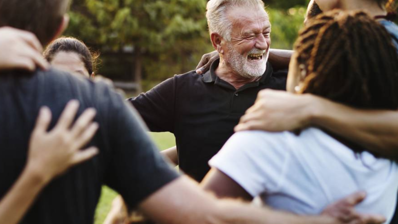Matt Heath: You gotta take the love wherever you find it
- Publish date
- Monday, 29 Jan 2018, 12:53PM

Last week I paid a man 50 bucks to cuddle me.
It was really good. I was trying to get a female sex worker to do it but none were keen.
So I paid a guy called Nick off the street. It was a solid, manly back-patting cuddle with the groins a foot apart. Still well worth the $50.
Sex workers are willing to do a lot of things. So it was reasonably insulting none were willing to appear on my radio show. Even more insulting when my cuddler gave my co-host Jeremy Wells a hug for free.
Why was I paying for cuddles? Well apparently lonely baby boomers are turning to the sex industry in increasing numbers for hugs and chats. No lovemaking just company.
It's sad. Not because there's anything wrong with visiting a sex worker. I have never understood why people look down on them. Why is the word 'whore' an insult? Who cares what people do?
Surely anyone can have sex with whoever they want as long as the other party is keen. If they're so keen they are willing to pay for it — brilliant. Win-win.
No, the reason I find it sad that baby boomers are paying for cuddles is because loneliness is sad. Even when it's not your own.
It's a weird thing. We are such social animals that it hurts to not be around each other.
Bears, moose, rhinoceroses, aardvarks, badgers, koalas and foxes don't need anyone (unless they're mating). But we sapiens freak out if we spend more than 24 hours on our own.
When we think about Andrew Fagan's solo yachting adventures, we're more impressed with his ability to be alone for long periods of time, than we are with his incredible sailing skills.
Take prison. A terrifying place where lots of really bad things can happen. Yet the worst punishment in prison is solitary confinement. No matter how bad the people in the yard are, it's considered worse to be on your own.
Some experts now claim being lonely is as bad for your health as obesity. A Brigham Young University study stated that loneliness can be as bad as smoking 15 cigarettes a day.
The Harvard Business Review put it like this — "Loneliness is a growing health epidemic. We live in the most technologically connected age in the history of civilisation, yet rates of loneliness have doubled since the 1980s."
We are pack animals. There is nothing in life better than being in a team and working towards a goal. That's what humans love to do.
It doesn't matter if we make it. It's the jokes, gossip, drama and companionship on the way that make us happy. We crave real bonds not digital ones.
The world we live in is very new but we're still running hunter gatherer software in our brains. Those guys spent their lives in close knit bands wondering around together fighting for survival. We can't do that anymore. But we still crave it. We need each other.
Family can't be trusted. Kids are great when they are around but they will leave you. If you do things right your offspring will grow up and find their own path. You are unlikely to see them more than once a week once they have families of their own.
Give Cat Stevens Father and Son a spin for a complete explanation of why they have to go.
Your partner can't be trusted. He or she is likely to leave you at some point. Either for someone else or the grave. Your job will leave you too.
So get some teams together. It's easier said than done but reach out and find a bunch of back-up plans. Multiple long-term hangout options. Go old school: rugby clubs, bowling clubs, charity work, croquet, orientation, bridge groups, model airplanes, chess clubs, key parties - whatever you're into. Find people to do stuff with. It doesn't matter what it is.
You might get knocked back a few times. Many of the people you meet will be dicks. Maybe you are too. I'm a bit of a dick. But whoever you are there are people out there for you somewhere.
Whatever age we are we humans are happier in a pack. So form as many as you can. Either that or bankrupt yourself paying sex workers for cuddles.
Not that there is anything wrong with that.
This article was first published on nzherald.co.nz and is republished here with permission.
Take your Radio, Podcasts and Music with you

